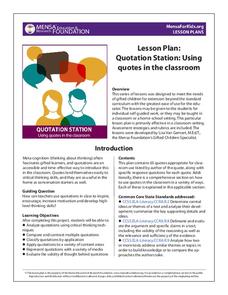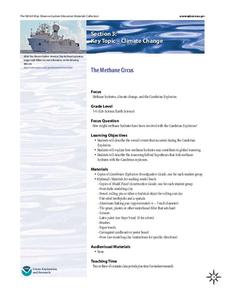Science Matters
Landforms from Volcanoes
Three major types of volcanoes exist: cinder cone, composite/strata, and shield. The 18th lesson in a 20-part series covers the various landforms created from volcanoes. Scholars work in pairs to correctly identify the three...
Curated OER
How Safe is that Fresh Autumn Cider?
Corn stalks and pumpkins, caramel apples and cider, falling leaves and brisk nights. There are a few of autumn's favorite things. But how safe is that unpasteurized cider bought at the roadside stand? Young researchers investigate the...
ReadWriteThink
Teaching Point of View With Two Bad Ants
What better way to explain the concept of point of view than from an ant's perspective! After reading Two Bad Ants, pupils identify the point of view of the ants by studying the text and pictures. Then, they fill out a...
NOAA
Journey to the Unknown
What's it like to be a deep-sea explorer? Tap into the imaginations of your fifth and sixth graders with a vivid lesson, the second part of a six-part adventure. Learners close their eyes and submerge themselves in an expedition aboard...
Ohio Department of Education
Observe Then Infer
To develop their skill at drawing inferences from observations, sixth graders rotate through six stations, conduct a series of experiments, make observations, and draw inference from what they observe.
MENSA Education & Research Foundation
Quotation Station: Using Quotes in the Classroom
An informative list compiled with quotes, authors, and discussion questions, along with 20 out-of-the-box application ideas, make up the collection of lessons geared to spark dialogue and creative thinking about quotations.
School Improvement in Maryland
Regulatory Agency
Five governmental regulatory agencies are tasked to respond to market failure. Groups investigate the roles of each of these agencies as well as the social, economic, and political impact of their actions.
Missouri Department of Elementary
The Successful Student: What's Your Style?
Everyone is different, and they learn differently, too. After discussing what it is to be a good student, class members participate in the next lesson plan that explores their individual learning styles.
NPR
Female Olympians Lesson Plan
For every strong and determined female Olympian, there are millions of young girls watching and becoming inspired. Middle and high schoolers learn more about record-breaking and history-making Olympian women with a presentation from the...
NASA
A Different Perspective
What can we learn from the data? Young scholars analyze actual solar data to answer specific questions. The activity presents an opportunity for an open-ended investigation of the data to conclude a five-part series on solar winds.
California Department of Education
Me and My Career
Your career search starts here! Sixth grade scholars begin their journey toward college and career readiness in the first of a five-part series of lessons. Individuals identify where their interests lead them using the Holland code, then...
National Endowment for the Humanities
Kate Chopin's The Awakening: Local Color in the Late 19th Century
Kate Chopin's The Awakening introduces readers not only to the lush Louisiana setting of Grand isle but also to the nuances of Creole culture. the second lesson in a three-part series examines how Chopin's use of literary realism and...
NOAA
Ocean Exploration
Where am I? The second installment of a 23-part NOAA Enrichment in Marine sciences and Oceanography (NEMO) program starts with pupils guessing the years in which major ocean exploration events took place. The lesson then focuses on how...
Federal Reserve Bank
Cash Flow and Balance Sheets
What is your car worth? How much do you owe? Individuals create their personal cash flow and balance sheets. They learn the difference between an asset and liability using their personal information to complete the activity.
NOAA
Mapping the Ocean Floor: Bathymetry
Bathymetry is not a measure of the depths of bathtubs! Through the three lessons, scholars explore two different types of maps and how they are made. The resource focuses on topographic and bathymetric maps and teaching the techniques...
NOAA
The Methane Circus
Step right up! An engaging research-centered lesson, the third in a series of six, has young archaeologists study the amazing animals of the Cambrian explosion. Working in groups, they profile a breathtaking and odd creature and learn...
NOAA
Where Have All the Glaciers Gone?
What happens when ice melts? Well ... water happens. When that melting ice is a glacier, the amount of water that results produces change throughout the world. Middle school science sleuths uncover the truth about global...
NOAA
Oceans of Energy
Are the earth's oceans really just giant batteries, waiting for their energy to be harnessed? Middle school mechanical engineers will be shocked by the amazing amount of energy that forms around them after diving into part four of a...
NOAA
Microfriends
Is there medicine found in the organisms that live deep below the surface of the ocean? The fifth lesson in a six-part series has learners team up to research bacteria and the relationship it has with nearly every living thing on Earth....
NOAA
Build Your Own Ocean Ecosystem
Hold the sea in the palm of your hand! Amateur oceanographers work together to create models of an ocean ecosystem in the sixth and final installment in a series. Raise awareness of global ocean health issues through guided research,...
Curated OER
Ben Franklin
Students meet Ben Franklin and research his life accomplishments. In this lesson about the history of Benjamin Franklin, students will visit several websites in order to learn about this Founding Father. Students follow a worksheet with...
Curated OER
Growing a Winter Garden
Second graders listen to planting story, identify vegetables in pictures, and watch teacher demonstrate proper way to plant seeds in soil, and water. Students then plant seeds into their own containers.
Curated OER
Grammar Through Jeopardy
Young scholars create questions for a grammar based version of a Jeopardy quiz game. The teacher assesses student questions and decides which questions should be used in the game. Individuals compete using proper grammar, phonics, and...
Curated OER
There Was an Old Lady Who Swallowed a Fly
Fourth graders examine the new vocabulary associated with the book, There Was an Old Lady Who Swallowed a Fly before listening to a teacher read aloud of the book. They complete a choral reading of the story, sequence it, and write...
Other popular searches
- Create Teacher Websites
- Spanish Teacher Websites
- Medical Teacher Websites
- Teacher Websites K 2
- Teacher Websites Primary
- Agriculture Teacher Websites
- Teacher Websites Benefits
- Science Teacher Websites
- Health Teacher Websites
- Teacher Websites Critiques























